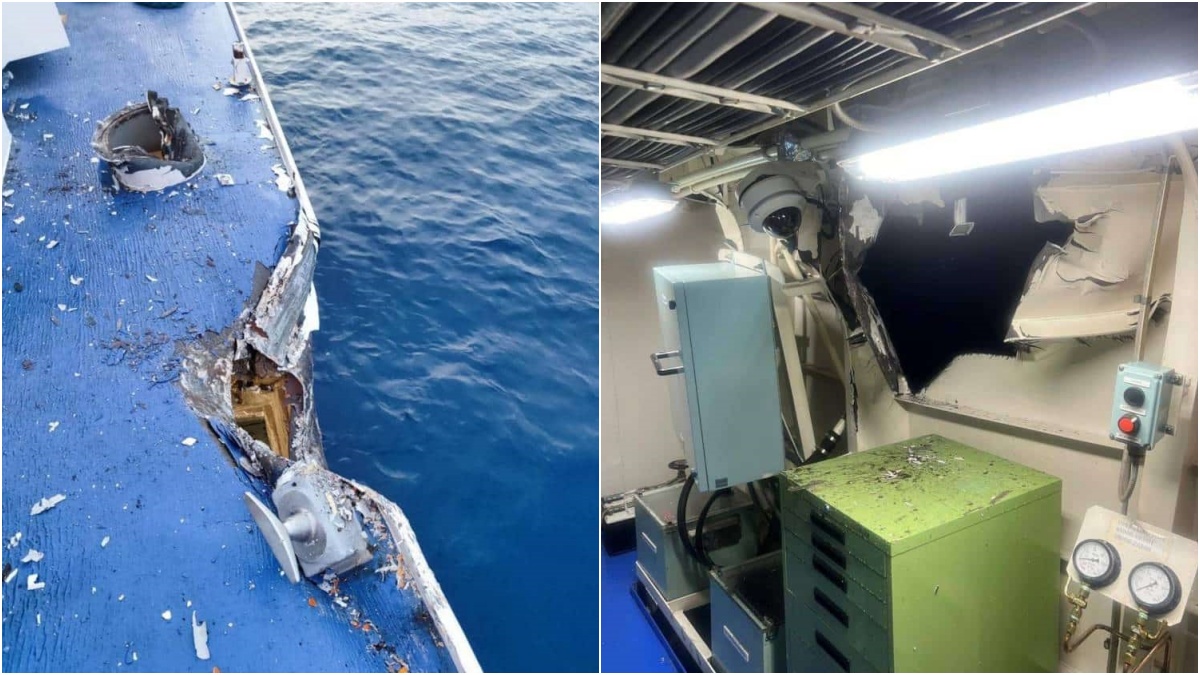
ANOTHER CONFRONTATION Images released by the Philippine Coast Guard, through the X account of its spokesperson Commodore Jay Tarriela, show the extent of damage sustained by its ships after these were rammed by China Coast Guard vessels early Monday near Escoda (Sabina) Shoal in the West Philippine Sea.
MANILA, Philippines — China has again accused the US and other allies of the Philippines of meddling in the maritime dispute between Beijing and Manila and “provoking confrontation” in the South China Sea after its coast guard ships rammed and damaged two Philippine Coast Guard (PCG) vessels near a shoal off Palawan province early this week.
“The US and certain countries are not parties to the South China Sea issue and have no right to interfere in maritime matters between China and the Philippines,” the Chinese Embassy in Manila said in a statement on Tuesday, a day after the collision off Escoda (Sabina) Shoal.
“They should stop provoking confrontation in the South China Sea and cease actions that undermine regional stability and exacerbate tensions,” the statement said.
READ: PH vessels rammed, harassed by China anew in West Philippine Sea – Malaya
National Security Adviser Eduardo Año and his US counterpart Jake Sullivan expressed “grave concerns” over China’s recent “illegal, aggressive and dangerous actions” over Panatag (Scarborough) Shoal and at Escoda Shoal, which they discussed during a phone call on Tuesday, according to a National Security Council (NSC) statement.
The ramming of the PCG vessels last Monday followed a “dangerous maneuver” by two Chinese combat jets against a Philippine Air Force (PAF) plane, which was conducting a routine maritime security operation over Panatag, also called Bajo de Masinloc, early this month.
The Chinese fighter planes fired flares into the path of the twin-propeller PAF aircraft. The PAF plane and its crew returned safe to Clark Air Base.
‘Unassailable rights’
The two officials exchanged information on the current maritime security situation in the region during the call, the NSC said on Wednesday.
Año underscored the Philippines’ “unassailable rights” in the West Philippine Sea based on international law and the 2016 arbitral award and thanked the US government for its “unremitting support and ironclad commitment” to the Philippines-US alliance.
Sullivan also commended the inaugural Philippines-Vietnam joint coast guard exercise early this month as well as Manila’s efforts to expand the conduct of maritime cooperative activities with like-minded countries in the region and beyond.
China is also in conflict with Vietnam over their competing claims to parts of the South China Sea. While the Philippines also has a maritime dispute with Vietnam, the two countries are much less belligerent to each other.
Clashing versions
During Monday’s predawn incident, the PCG’s BRP Bagacay and BRP Cape Engaño were en route to resupply the Philippine military outposts on Patag and Lawak islands when two ships made “unlawful and aggressive maneuvers” against the two PCG ships, according to the NSC.
CCG spokesperson Geng Yu, however, said that the two PCG vessels “deliberately collided” with one of its ships.
A few days prior to this incident, Beijing filed a diplomatic protest against the deployment of the PCG’s largest vessel at Escoda, saying the ship had entered the shoal “without permission” from China.
The two PCG vessels that were rammed on Monday suffered damaged to their hulls, but none of their crews were hurt.
Later that day, the US Department of State “condemned” the CCG’s “reckless maneuvers” by “deliberately colliding” with the PCG ships. It said that this was an example of China using “dangerous and escalatory measures” to enforce its expansionist claim to nearly all of the South China Sea.
International concern
Canada’s ambassador to Manila, David Hartman, also condemned the CCG’s actions while Japanese Ambassador Endo Kazuya expressed “serious concern” and said that Japan stands by the Philippines in maintaining a “rules-based order.”
The European Union, France, Germany, United Kingdom, Australia and South Korea also released statements expressing deep concerns about the incident and called on China to adhere to the United Nations Convention on the Law of the Sea.
The Chinese Embassy criticized them for quickly denouncing the CCG.
“The US State Department issued a statement, and Embassies of the US and some of its allies in the Philippines also wasted no time in taking sides and making inflammatory statements, which raises questions about their underlying motives,” the Chinese embassy statement said.
Beijing had been accusing Washington of using the South China Sea conflict to “gang up” on China with other countries amid the intensifying competition between the two superpowers in the Indo-Pacific region.
The US, Canada, and Japan have been consistent supporters of the 2016 arbitral ruling which reaffirmed the Philippines’ 370-kilometer exclusive economic zone (EEZ) in the country’s western waters and invalidated China’s sweeping claims for having “no legal basis.”
Gained ‘momentum’
Following their phone conversation, the White House said that Año and Sullivan cited “continued historic momentum” of their two countries’ alliance and discussed the recent $500 million American foreign military financing program for the Philippines under the Indo-Pacific Security Supplemental Appropriations Act.
Both officials discussed how this additional security assistance could bolster the cooperation of the two countries “in support of international maritime law in the South China Sea,” a White House statement said.
Sullivan reiterated the ironclad US commitment to the Mutual Defense Treaty, which commits Manila and Washington to come to each other’s defense in case of an armed attack.
The 1951 treaty also covers armed attacks on Philippine military forces and its coast guard, public vessels, or aircraft anywhere in the South China Sea. —with a report from Inquirer Research
For comprehensive coverage, in-depth analysis, visit our special page for West Philippine Sea updates. Stay informed with articles, videos, and expert opinions.
